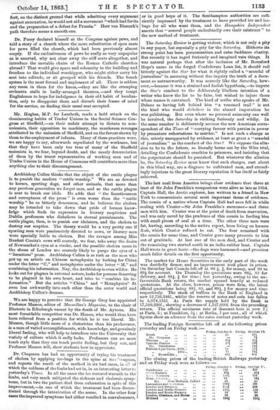Archbishop Cullen thinks that the object of the cattle plague
is to punish the modern "cattle worship." We are so devoted to horses, sporting dogs, and other animals, that more than any previous generation we forget men, and so the cattle plague is sent to break our idols. He adds that "the licentiousness and corruptness of the press" is even worse than the "cattle -worship " he so bitterly denounces, and he believes the cholera May be intended to take down that pride of human know- ledge which finds its expression in literary scepticism and Dublin professors who disbelieve in eternal punishments. The 'cattle plague, then, is to punish our idolaters, and the cholera to destroy our sceptics. The theory would be a very pretty one if sporting men were passionately devoted to cows, or literary men were specially liable to cholera. But the ravages among Miss Burdett Coutta's cows will scarcely, we fear, take away the desire of Newmarket's eyes at a stroke, and the possible cholera cases in the slums of London are scarcely likely to purge the eyes of a ." licentious" press. Archbishop Cullen is as rash as the man who got up an article on Chinese metaphysics by looking for China under the letter "C," and metaphysics under the letter "M," and combining his information. Nay, the Archbishop is even wilder. He looks out for plagues in external nature, looks for persons deserving to be plagued in his own heart, and tries to "combine his in- formation." But the articles "China" and "Metaphysics" fit even less awkwardly into each other than the outer world and Archbishop Cullen's dreams.






























 Previous page
Previous page